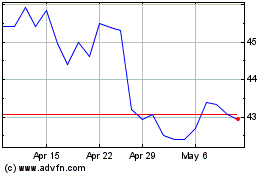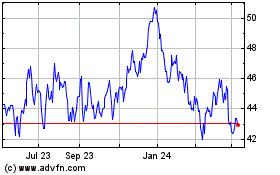Metals: Copper Pulls Back as Mine Strike Ends in Chile
March 24 2017 - 1:55PM
Dow Jones News
By Katherine Dunn and Ryan Dube
Copper prices fell on Friday, as the end of a strike at the
world's largest copper mine eased supply worries.
Copper for May delivery settled down 0.5% at $2.6310 a pound on
the Comex division of the New York Mercantile Exchange.
On Thursday, workers at the Escondida copper mine in northern
Chile said they would end a strike at the mine, which is
majority-owned by BHP Billiton Ltd.
The leader of the mine's largest union, Union No. 1, said
workers would return to work on Saturday. The workers had agreed to
implement an article that will allow them to return to work with
their current collective agreement for 18 months.
On Friday, the agreement to end the strike, which began Feb. 9,
was pushing prices down, but the size of the decline was muted,
noted Nitesh Shah, a commodities strategist at ETF Securities in
London, as the agreement hasn't resolved the underlying issues
behind the strike.
"It is sort of kicking the can down the road a bit," said Mr.
Shah.
The mine produces about 5% of the world's copper, and the
six-week strike took out about 1% of the world's annual copper
production, he estimated.
Other supply disruptions, at Freeport-McMoRan Inc.'s Grasberg
copper mine in Indonesia, which is stalled over an export dispute
with the government, and a strike at the Cerro Verde copper mine in
Peru, are continuing.
The decline in copper's price was likely muted by a lingering
expectation of better demand prospects for industrial metals on the
back of President Donald Trump's campaign promises to fuel
infrastructure spending and overhaul tax reform, Commerzbank said
in a note.
"This could turn out to be a mistake, however, especially if
U.S. President Trump loses the U.S. House of Representatives health
care reform vote that was postponed until today -- as this would
also jeopardize the planned tax reform," the German bank said.
Restrictions in Chinese cities on new real-estate buying could
also damp demand from China, the world's top consumer of copper,
the bank said. Chinese appetite for the metal far outstrips U.S.
demand, which is around 8%, and so any change in demand from China
is likely to have a far bigger effect on the supply balance than
Mr. Trump's policies, analysts have said.
Gold for April delivery edged higher, closing up 0.1% at
$1,248.50 a troy ounce ahead of the vote in the U.S. House of
Representatives on a health-care bill, which is being viewed by
some investors as a test of the Trump administration's ability to
enact its agenda.
The vote is scheduled for 3:30 p.m. EDT on Friday, but concerns
have been raised that the bill doesn't have sufficient support to
pass. Gold prices traded as low as $1,243.30 a troy ounce on Friday
before reversing losses.
"If it gets passed, the market will see it as one hurdle out of
the way for finally moving on to tax reform and other fiscal
stimulus measures," said Paul Wong, senior portfolio manager at
Sprott Asset Management. "If the Health-care Bill does not get
passed then the opposite is likely and gold should rise."
--Stephanie Yang contributed to this article.
Write to Katherine Dunn at Katherine.Dunn@wsj.com and Ryan Dube
at ryan.dube@dowjones.com
(END) Dow Jones Newswires
March 24, 2017 14:40 ET (18:40 GMT)
Copyright (c) 2017 Dow Jones & Company, Inc.
BHP (ASX:BHP)
Historical Stock Chart
From Mar 2024 to Apr 2024

BHP (ASX:BHP)
Historical Stock Chart
From Apr 2023 to Apr 2024
